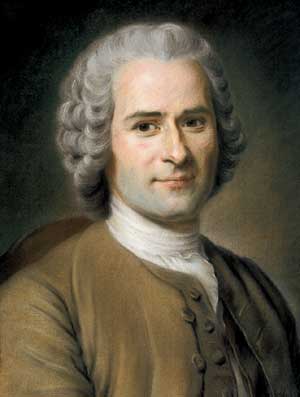
The Profession of Faith is Rousseau’s attempt at analyzing God and Religion. It concerns the Priest’s (the narrator) introspection of what his duties are as a human being. In particular, the Priest attempts to learn what mode of conduct God prescribes him. To decipher the “rules I ought to prescribe myself in order to fulfil my destiny on earth according to the intention of Him who put me there”. Consistent with the rest of the text, Rousseau emphasizes the significance of honest sentiment and its interpretation to draw out theological truths.
The Priest explores four stages of theological enquiry. The first stage talks about our sense organs and their function. The next stage discusses God and his properties, while the third analyses our position in the universe and society. Finally, the fourth stage talks about how we should conduct our lives. The passage in discussion is part of the narrative about the last stage.
Rousseau is constructing an analysis to find out his purpose and destiny. He is trying to read God’s motive in placing him on earth. He wants to find out what his moral duties are. He turns to the feeling of his heart and the sentiment expressed by it, to deduce his duties. Rousseau argues that, while reason and evidence are appropriate tools for discovering truths, they are capable of misleading too. But, paying close attention to the voice of one’s heart, the conscience, will reveal nothing but the truth. The priest infers, “Conscience is the voice of the soul; the passions are the voice of the body”. Our senses are linked to our bodies and ultimately to passions, which don’t necessarily correspond to morality. The priest cites examples of passionate feelings that had misled mankind in the past. He infers that while bodily instincts and feelings arising out of our passions can hold different values on the moral scale, the conscience, which acts as the instinct in the soul, assumes a flawless moral conviction.
One does not have to look beyond his own inner voice to understand what is moral. He alludes that external sources of knowledge, which includes professions by other philosophers as well as judgments formed via our senses are not trust worthy. Rousseau places strong faith in what his conscience conveys to him. He believes that there is no need for any external tool of moral inquiry than the voice of the soul. According to him, all that is required of the individual is the willingness to heed to its message, which is invariably sincere and honest.
To support his claim, Rousseau investigates the efficacy of our sense organs. For example, our senses tell us that selfishness is virtue. But selfish acts that would disadvantage others cannot be accepted as correct. While rationale that is formed from the sensory input can lead down the wrong path, a belief in one’s conscience and acceptance of its message will lead only to morally correct actions and consequences.
Given the topic under discussion – proper moral conduct – the lines in this passage are less controversial than the rest of the book. Rousseau’s line of thinking with respect to human morality was congruent with eminent philosophers of the time, including David Hume.
There is no doubt that Rousseau is carried away by emotion. Personally, while I appreciate Rousseau’s earnestness of effort to uncover meaning, I do not subscribe to his emphasis on sentiment and feeling, as they are experiences at an individual level and this technique of enquiry does not allow experimental verification of the hypothesis by any means.
Rousseau does not put forth a convincing rational argument to consolidate his claim. To the contrary, he makes a general appeal to the readers to trust their inner feelings, as he believes that they cannot be wrong. It begs the question: But how can universal moral principles accepted without recourse to just reasoning? Giving precedence to the sentiment of the heart ahead of rational analysis was not the method of inquiry of the Enlightenment period. Criticisms of him and disapproval of major parts of the book by his intellectual peers seem just.
I agree with Rousseau that our outer senses are poor equipment for unraveling moral truths. Yet, while emphasizing on the validity of feelings that arise from the heart, he fails to distinguish between those feelings which comprise conscience and the rest which are mere prejudice. This weakens his argument and leaves it incomplete.
Work Cited:
Rousseau, Jean-Jacques Rousseau. Emile, or On Education. Trans. Allan Bloom. New York: Basic Books, 1979.